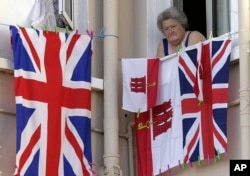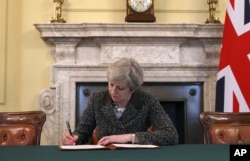Britain's exit process from the European Union only formally began last week, but already London is engaged in a heated dispute with Brussels and Spain over the future sovereignty of its overseas territory of Gibraltar.
The mountainous outcrop on the southern tip of Spain known as "The Rock" was ceded to Britain by Madrid 300 years ago and has been an occasional source of tension ever since.
In its negotiating guidelines published last week, the European Union said any deal struck between the bloc and Britain won't apply to Gibraltar, unless Spain agrees to it. The EU inclusion of Gibraltar angered many British lawmakers, but there's little they can do, says Professor Andrew Canessa, a Gibraltar expert at the University of Essex.
"Now that the UK is not in the EU, then the EU will now defend its members' interests," he said. "And in this case, the members' interests are Spain. And so Britain really doesn't have much of a way in to that discussion."
Events were held during the weekend to mark the 35th anniversary of the Falklands War, when Britain under then-Prime Minister Margaret Thatcher fought off an Argentine invasion of the disputed archipelago in the South Atlantic.
Invoking that war, former leader of the ruling Conservative party Michael Howard said current PM Theresa May is prepared for a fight.
"Thirty-five years ago this week, another woman prime minister sent a task force halfway across the world to defend the freedom of another small group of British people against another Spanish-speaking country, and I'm absolutely certain that our current prime minister will show the same resolve in standing by the people of Gibraltar," he said.
But speaking Monday, May played down those comments, telling reporters, "What we are doing, with all EU countries in the EU, is sitting down and talking to them." But, she added, the British policy on Gibraltar would not change.
Spain's Foreign Minister Alfonso Dastis expressed surprise at the tone of comments from Britain, saying Monday that "bringing into the debate events from the past like the Malvinas [Falklands] Islands is completely out of context. Someone in the United Kingdom is losing their calm, and there is no reason for doing that."
Gibraltar's residents face an uncertain future. Ninety-six percent voted to remain in the European Union in last June's Brexit referendum; the economy, primarily financial services and gambling, is reliant on membership in the Single Market.
"It's not so much that Spain will take Gibraltar over, or have a much more serious threat on British sovereignty in Gibraltar, but rather that the economic basis of Gibraltar is threatened," said analyst Andrew Canessa.
Spain dealt Britain another setback Monday by suggesting it would not veto any effort by an independent Scotland to join the European Union, raising the possibility Britain could split after Brexit.
Previously Madrid had been opposed to Scottish EU membership, as it feared emboldening Catalonian separatists in the north of Spain who want to hold an independence referendum by October.







